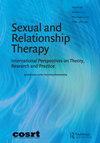自传体记忆中性和关系心理表征的整合与性幸福有关
IF 1.4
4区 心理学
Q3 PSYCHOLOGY, CLINICAL
引用次数: 0
摘要
摘要性幸福的决定因素通常被确定为性满意度和关系满意度,这两者都包括对伴侣关系的关注。这种概念化排除了性活跃的单身个体,同时将性和关系满意度与性幸福混淆为决定因素和结果。在这项研究中,我们提出了一个专注于认知性和关系性心理表征作为性健康决定因素的个人视角。基于行为系统理论,我们认为性心理表征和关系心理表征的高度整合与性幸福指标相关,而整合程度较弱的心理表征则与较低的性幸福水平相对应。我们开发了一种新的编码方案来测量性自传体记忆叙事中性和关系心理表征的认知整合。我们研究了它与性幸福指标(满意度、激情和社会性行为)的关系。在142名学生的样本中,结果表明记忆中的性和关系表征的整合与性满足和和谐激情正相关,与强迫性激情和社会性欲望负相关。结果表明,自传式记忆中性和关系心理表征的综合认知组织可以反映出更高的性幸福感。讨论了临床意义。自传式记忆是一个丰富的系统,它是由反映个人个性的心理表征(如图像、文字、脚本)相结合而形成的。测量性记忆中关系和性心理表征的组织——一种创新的方法——提供了一个反映性幸福的个体指标。这是一个丰富的途径,让我们对与性健康相关的机制有了新的理解,超越了关系状态或个人关系的类型。关键词:自传式记忆;认知整合;亲密关系;本研究由加拿大社会科学与人文研究理事会资助,基金号435-2017-1358。本文章由计算机程序翻译,如有差异,请以英文原文为准。
Integration of sexual and relational mental representations in autobiographical memories is associated with sexual well-being
AbstractDeterminants of sexual well-being have often been identified as sexual and relational satisfaction, which both include a focus on partner relationship. Such a conceptualization excludes sexually active single individuals, while confusing sexual and relational satisfaction with sexual well-being as both determinant and outcome. In this research, we propose an intrapersonal perspective focused on cognitive sexual and relational mental representations as determinants of sexual well-being. Based on behavioral systems theory, we suggest that a high level of integration of sexual and relational mental representations should be associated with sexual well-being indicators, whereas a weaker level of integration should correspond to a lower level of sexual well-being. We developed a novel codification scheme to measure the cognitive integration of sexual and relational mental representations in narratives of sexual autobiographical memories. We examined its associations with sexual well-being indicators (satisfaction, passion, and sociosexuality). In a sample of 142 students, results showed that integration of sexual and relational representations in memories was positively associated with sexual satisfaction and harmonious passion, and negatively with obsessive passion and sociosexual desire. Results suggest that an integrated cognitive organization of sexual and relational mental representations in autobiographical memories can reflect a greater sexual well-being. Clinical implications are discussed.Lay SummaryAutobiographical memories are rich systems formed by the association of mental representations (e.g. images, words, scripts) that may reflect individual’s personality. Measuring organization of relational and sexual mental representations in sexual memories– an innovative method – provides an individual indicator reflecting sexual well-being. This is a wealthy avenue for having a new comprehension of mechanisms associated with sexual well-being, beyond relationship status or the type of personal relationships.Keywords: Autobiographical memoriescognitive integrationintimacymental representationssexual satisfactionsexual well-being Disclosure statementNo potential conflict of interest was reported by the authors.Additional informationFundingThis work was supported by the Social Sciences and Humanities Research Council of Canada under Grant 435-2017-1358.
求助全文
通过发布文献求助,成功后即可免费获取论文全文。
去求助
来源期刊

Sexual and Relationship Therapy
PSYCHOLOGY, CLINICAL-
CiteScore
3.80
自引率
9.10%
发文量
37
期刊介绍:
Sexual and Relationship Therapy is a leading independent journal in its field, well established and internationally recognized. It offers an active, multidisciplinary forum for review and debate across the spectrum of sexual and relationship dysfunctions and therapies. The journal presents original research and best practice and is a vehicle for new theory, methodology, and application. Sexual and Relationship Therapy is edited by a respected international team and publishes contributions from around the world. It is the official journal of the British Association for Sexual and Relationship Therapy (BASRT).
 求助内容:
求助内容: 应助结果提醒方式:
应助结果提醒方式:


